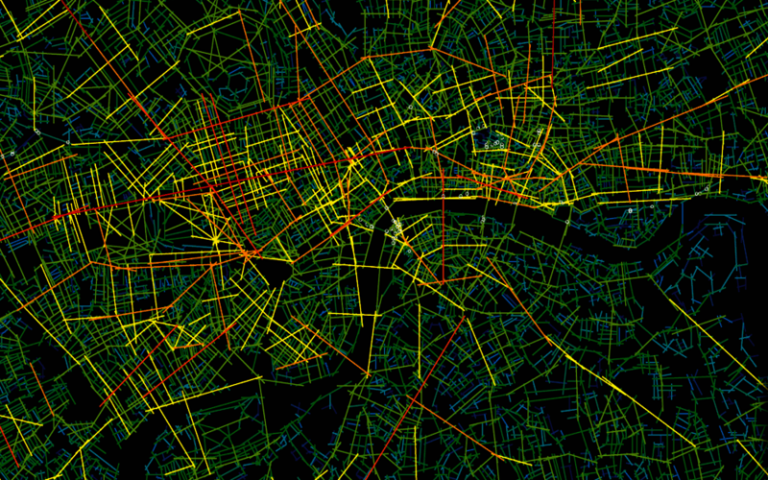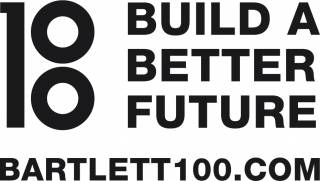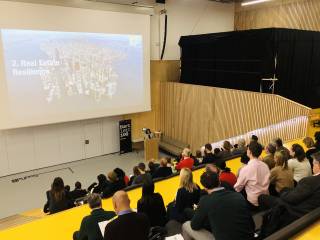Real Estate: The next 100 years
06 November 2019, 9:00 am–7:00 pm

On November 6th 2019, the Bartlett Real Estate Institute will explore the next hundred years of real estate. It will be an opportunity for you to glimpse possible futures with a variety of global experts and visionaries. Spend a day discovering what the future might hold, discussing the issues and think about the solutions and opportunities that present themselves.
Event Information
Open to
- All
Availability
- Sold out
Organiser
-
Nedhi Vasu
Location
-
Bartlett Real Estate InstituteUCL Here East8 – 9 East Bay Lane, Queen Elizabeth Olympic ParkLondonE15 2GWUnited Kingdom
How will the buildings that you create today be used in 100 years’ time? Will they still be standing? Who will own, manage and occupy them? How will regulation, policy, investment and returns work? How do we avoid the effects of climate change on real estate and avoid the effects of real estate on climate change? How will digital technology change the way we use buildings?
You will leave with new perspectives on our eight themes for world real estate:
- Digital Disruption
This theme focuses around the changes the digital economy and digital technology bring to real estate. It explores its aspects which includes everything from the way we register land, to the way we record what we build. More importantly, it changes a vast majority of human activities and therefore changes the way we use cities and what cities are in the digital age.
- Housing Affordability
Every city in the world has an issue with the availability and the affordability of housing. However it can take subtly different forms in different places and this theme is about properly understanding and measuring affordability, as well as presenting policies and solutions to the problem. What people think is a local problem is actually a global one, as much as every city with a few exceptions seem to have this issue.
- Community Inclusion
As the world over international investment and finance move towards a much more people and service focused mode of operation, what occupies want increasingly matters. A huge challenge for the industry is therefore understanding the community they are building for and moving towards creation with people rather than doing the built environment to them. This theme explores how to effectively co-create buildings and places with people.
- Beyond Placemaking
Placemaking is a buzz word for many developers but understanding the science of place is still in its early stages. This programme of learning seminars and research brings together new forms of finance, business models, stewardship and infrastructure design as well as built environment design to understand what sort of places are needed to be sustainable in the 21st century.
- Real Estate Resilience
This theme deals with the challenges posed to land, cities, neighbourhoods and buildings, not only by environmental change but also social and economic change in the 21st century. It is focused on holistic changes to overcome these challenges and to integrate resilience in all the other state projects.
- Infrastructure Interface
Real estate, at its root, is about immovable assets. This means land or anything built on it and so we find it increasingly impossible to distinguish between real estate and many infrastructure projects. So this theme is about understanding not only how infrastructure impacts real estate value, but also understanding the continuum between these traditionally distinct sectors as well as what real estate might learn from infrastructure finance, procedures, practices and vice versa.
- Health and Wellbeing
Human activity and productivity is at the heart of all types of real estate value, both tangible and intangible. The health and wellbeing of everyone who uses the built environment (that’s all of us) is therefore paramount. Wise employers, owners and investors are therefore increasingly concerned about the impact of what they build on this element of life. These theme includes not only the specific design of healthcare facilities, but also looks at the broader impacts of these on the rest of the built environment and how the built environment impacts broader national health issues.
- Learning Environments
In the fast changing digital age, life-long learning has become an accepted norm which impacts all aspects of economic, social and personal life. This will be reflected in the built environment and the provision of new learning spaces as well as traditional schools, colleges and universities. The BREI not only offers an MSc in Learning Environments, but also in this theme explores all built environments from the perspective of lifetime learning.
You will hear how change and new innovations may alter the way we think about and value different types of property, how disruption in a variety of sectors will affect the industry and what you – and your children and grandchildren will need to look out for.
In the ‘silo mashup’ workshops, you will see how seemingly unconnected areas like health and place-making or climate change and tech inter-relate and your participation alongside experts in these fields may present the key to future developments in a variety of situations.
The exciting thing is that we don’t know yet what will happen as a result of this event and what new answers, ideas and solutions might be found to the wicked questions facing us in the 21st century. What we do know is that every participant will be transported outside their usual sphere of expertise – and possibly your comfort zone – in a safe and friendly but stimulating way.
 Close
Close



